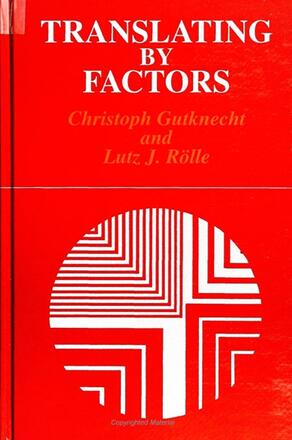
Translating by Factors
Alternative formats available from:
Description
By emphasizing, using English-German examples, the notion of factor set, this book fosters the awareness that successful and adequate translation requires properly accounting for the pertinent translation factors in each individual case. The factor approach gives translation criticism an objective yardstick for assessing the quality of translations . The authors explore the linguistic factors, including treatment of illocution and its indeterminacy, and perlocution, as well as non-linguistic factors such as factuality, situation, and culture. The book also includes aspects more genuinely linked to the notion of translation itself, such as translation units and word class and the nature and status of factors in translation theory.
Christoph Gutknecht is Professor of English Linguistics in the Department of English Studies at Hamburg University. His previous publications include Die mittelhochdeutsche Versnovelle 'Von zwein koufmannen' des Ruprecht von Wurzburg; Friedrich der Grosse: De la litterature allemande. Mit der Moserschen Gegenschrift; Generative Linguistik: Ergebnisse moderner Sprachforschung; the Spanish edition of Linguistica generativa. Moderna investigacion del lenguaje; Practical English Phonetics: A Programmed Course in English Pronunciation; Grundbegriffe und Hauptstromungen der Linguistik; and Kontrastive Linguistik: Zielsprache Englisch. He is the editor of the international series Forum Linguisticum and Anglo-American Forum and co-editor of Beitrage zur Phonetik und Linguistik. Lutz J. Rolle teaches and researches in the English Department of Hamburg University. He is co-author of 'Die multifaktorielle Translationssituation bei den Modalverben des Sprachenpaares Deutsch-Englisch', in Quast (ed. ): Einheit in der Vielfalt. Festschrift fur Peter Lang zum 60. Geburtstag.
Reviews
"The notion of factor is essential to translation studies since all important aspects relating to them can be expressed in terms of it. By systematically exploring all possible kinds of translation factors, the authors make a substantial and remarkable contribution to the evolution of translation studies. There is no study which examines aspects of translation in such imaginative and instructive ways. This book represents a supreme standard of scientific accomplishment. " — Christian Todenhagen, California State University, Chico
"I like the authors' willingness and ability to analytically address thorny and subtle problems of translation which are all too often simply avoided as unbreachable—their heavy reliance on naturalistic as opposed to contrived examples. " — Joseph L. Malone, Barnard College and Columbia University